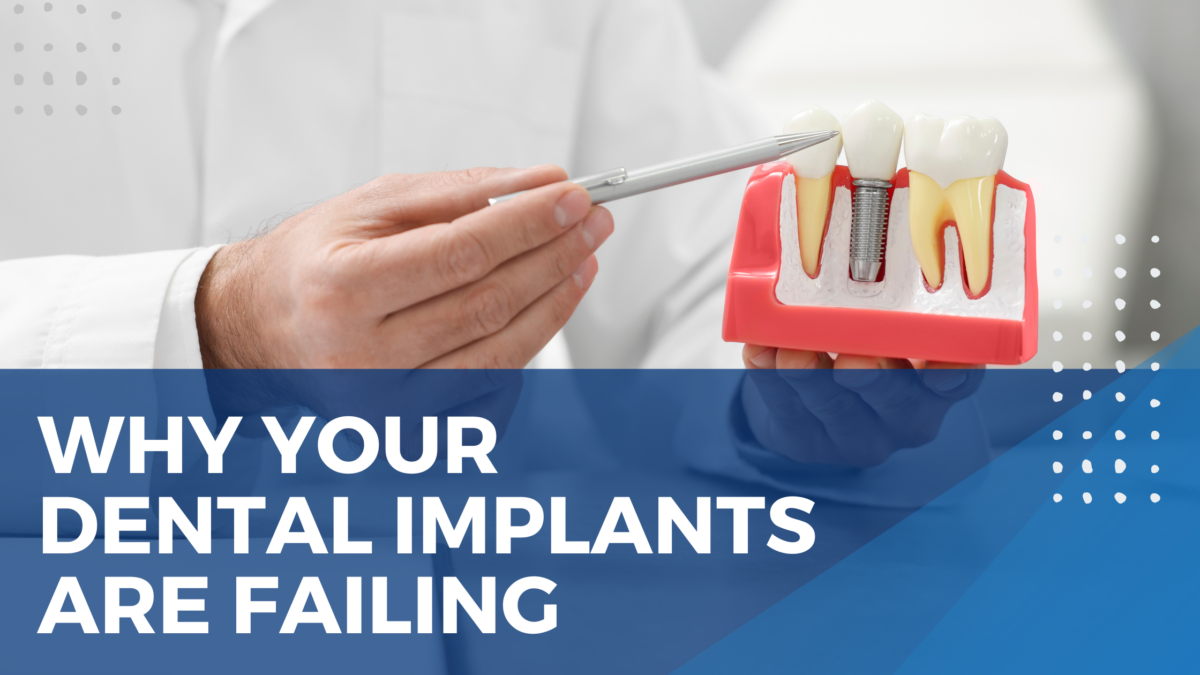5 Common Reasons for Dental Implant Failure

Dental implants are one of the most reliable solutions for replacing missing teeth, with a success rate exceeding 90%. However, implant failure can occur, leaving patients concerned about their investment and oral health. Understanding the potential causes of failure can help you avoid complications and ensure the longevity of your implant.
In this article, we’ll explore five common reasons for dental implant failure, explain how to identify warning signs, and share tips to maintain healthy implants for years to come.
1. Poor Oral Hygiene
Dental implants, like natural teeth, require consistent oral hygiene. Neglecting your oral care routine can lead to peri-implantitis, an infection that damages the gum and bone around the implant.
How Poor Hygiene Leads to Failure:
- Bacteria buildup around the implant causes inflammation.
- Left untreated, inflammation progresses to bone loss and implant instability.
Signs to Watch For:
- Red, swollen, or bleeding gums around the implant.
- Persistent bad breath or a foul taste in your mouth.
- Discomfort or tenderness near the implant.
How to Prevent It:
- Brush your teeth twice daily with a soft-bristle toothbrush.
- Floss around the implant using dental floss or interdental brushes.
- Rinse with an antimicrobial mouthwash to reduce bacteria.
- Visit your dentist regularly for professional cleanings and exams.
2. Insufficient Jawbone Density
A strong jawbone is the foundation of a stable dental implant. If your jawbone is too thin or weak, it may not provide enough support, leading to implant failure.
Why Bone Density Matters:
- Dental implants rely on osseointegration, the process where the bone fuses with the implant.
- Weak or insufficient bone may not hold the implant securely.
Causes of Bone Loss:
- Tooth loss without replacement.
- Gum disease that deteriorates bone.
- Aging or trauma to the jawbone.
Solutions to Strengthen Bone:
- Bone Grafting: Adds volume and density to the jawbone before implant placement.
- Guided Bone Regeneration: Uses specialized membranes to encourage natural bone growth.
- Regular dental checkups to monitor and maintain jawbone health.
3. Smoking and Tobacco Use
Smoking is a significant risk factor for implant failure. Tobacco not only harms your overall health but also hinders your body’s ability to heal after surgery.
How Smoking Affects Dental Implants:
- Reduces blood flow to the gums and jawbone, slowing the healing process.
- Increases the risk of infection and peri-implantitis.
- Weakens the bond between the implant and bone.
Statistics:
- Smokers are up to three times more likely to experience implant failure than non-smokers.
What You Can Do:
- Quit smoking before implant surgery and avoid tobacco during recovery.
- Seek support from smoking cessation programs if needed.
- Discuss your smoking habits with your dentist to create a personalized care plan.
4. Implant Placement Errors
The success of a dental implant depends heavily on proper placement. Errors during the procedure can lead to complications like nerve damage, implant instability, or failure to integrate with the bone.
Common Placement Errors:
- Incorrect angling or positioning of the implant.
- Placing the implant too close to adjacent teeth or nerves.
- Using insufficient imaging for planning the procedure.
Why Expertise Matters:
- An experienced dentist uses advanced tools, like 3D imaging, to ensure precise placement.
- Proper planning minimizes risks and maximizes implant stability.
How to Choose the Right Dentist:
- Look for a dentist with specialized training in implantology.
- Ask about their success rate and the number of implants they’ve placed.
- Ensure they use advanced technology, such as CT scans and surgical guides.
5. Pre-Existing Medical Conditions
Certain medical conditions can increase the risk of implant failure by slowing healing or compromising bone health.
Conditions to Consider:
- Uncontrolled Diabetes: Impairs blood flow, delaying recovery and increasing infection risk.
- Autoimmune Disorders: Can cause the body to reject the implant.
- Osteoporosis: Weakens bones, reducing implant stability.
- Chronic Gum Disease: Affects the surrounding tissue and bone.
Managing Risk Factors:
- Inform your dentist about your full medical history.
- Work closely with your primary care physician to manage chronic conditions.
- Follow your dentist’s pre- and post-operative care instructions carefully.
Bonus: Recognizing Implant Failure Early
Early intervention is crucial if you suspect your dental implant may be failing.
Common Symptoms of Implant Failure:
- Persistent pain or discomfort around the implant.
- Looseness or instability of the implant.
- Difficulty chewing or biting.
- Swelling, redness, or pus around the implant site.
What to Do If You Notice These Signs:
- Contact your dentist immediately for an evaluation.
- Schedule regular checkups to catch issues early.
- Follow aftercare instructions to minimize complications.
How to Prevent Dental Implant Failure
While some factors are beyond your control, there are proactive steps you can take to increase the chances of implant success:
- Maintain Excellent Oral Hygiene:
- Brush, floss, and rinse regularly to keep your implant clean.
- Attend Regular Dental Visits:
- Professional cleanings and exams help identify potential problems early.
- Follow Your Dentist’s Instructions:
- Adhere to pre- and post-surgical care guidelines to promote healing.
- Manage Health Conditions:
- Keep chronic conditions like diabetes or osteoporosis under control.
- Avoid Risky Habits:
- Quit smoking and minimize grinding or clenching your teeth.
Dental implants are a transformative solution for tooth replacement, offering long-term benefits when cared for properly. By understanding the common reasons for implant failure and taking preventive measures, you can protect your investment and enjoy a healthy smile for years to come.
If you’re considering dental implants or have concerns about your current ones, consult a qualified dental professional. Their expertise and personalized care can help you achieve the best possible outcome.
